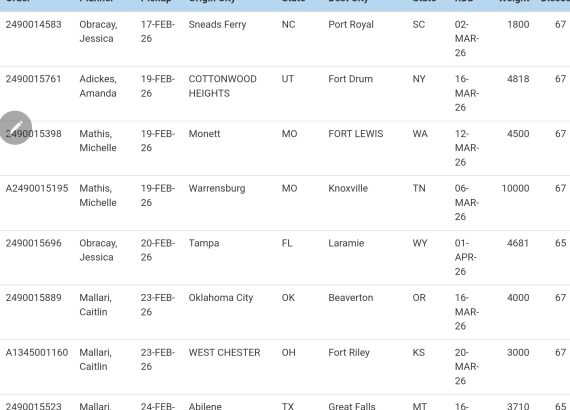Behind the Wheel: The Inside Scoop on Trucking Scams and brokers, How to Stay Safe

The trucking industry is susceptible to various fraudulent schemes, and truckers must be vigilant to avoid falling prey to these scams. One prevalent scam is the “phantom delivery” scheme, where a fraudulent company hires a trucker to transport goods, only to vanish with the cargo upon delivery. Another common scam is “fuel theft,” where thieves steal fuel from a parked truck, leaving the driver with a substantial bill to cover the stolen fuel.
Furthermore, there are scams involving fake weigh stations, where truckers are coerced into paying fines for allegedly overweight loads, only to discover later that the station was illegitimate. These examples illustrate the numerous scams that truckers must be aware of to safeguard themselves and their cargo. Another widespread scam in the trucking industry is “broker fraud,” where dishonest brokers promise lucrative loads to truckers, only to disappear without paying for the completed delivery.
This can leave truckers financially strained and struggling to cover their expenses. Additionally, there are scams involving fake insurance companies, where truckers are sold bogus insurance policies that leave them vulnerable in the event of an accident or theft. It is essential for truckers to be aware of these common scams and take proactive measures to protect themselves and their livelihoods while on the road.
Staying Safe on the Road: Tips for Truckers to Avoid Scams
Verify the Legitimacy of Companies and Brokers
To avoid falling victim to scams, it’s crucial for truckers to verify the legitimacy of any company or broker before accepting a job. ( do an google search on broker) This can be done by checking their credentials and reputation online, as well as asking for references from other truckers who have worked with them in the past.
Be Cautious of Suspicious Job Offers
Truckers should be wary of any job offers that seem too good to be true, as they often are. If a job offer promises unusually high pay or seems suspicious in any way, it’s best to err on the side of caution and avoid taking the job.
Secure Your Cargo and Prevent Theft
To prevent theft while on the road, truckers should always secure their cargo and take steps to prevent theft. This can include using high-quality locks and security devices on their trailers, as well as parking in well-lit and secure areas whenever possible. Additionally, truckers should be aware of their surroundings and report any suspicious activity to the authorities. By taking these proactive measures, truckers can reduce their risk of falling victim to scams and ensure that they and their cargo arrive safely at their destination.
Scammers often target truckers by taking advantage of their need for work and their reliance on brokers and companies to find jobs. One common tactic is for scammers to pose as legitimate companies or brokers and offer high-paying loads to unsuspecting truckers. Once the job is completed, the scammers disappear without paying for the delivery, leaving the trucker out of pocket and struggling to cover their expenses.
Additionally, scammers may use fake weigh stations or other official-looking facilities to extort money from truckers, claiming that they have violated regulations or have overweight loads. It’s important for truckers to be aware of these tactics and take steps to verify the legitimacy of any job offers they receive. Another way that scammers target truckers is by using fake insurance companies to sell them fraudulent insurance policies.
These policies may seem legitimate at first, but when it comes time to make a claim, truckers may find that they are not covered or that the company does not exist. This can leave truckers vulnerable in the event of an accident or theft, and it’s important for them to be aware of this risk and take steps to verify the legitimacy of any insurance company they work with. By being aware of these tactics and taking proactive measures to protect themselves, truckers can reduce their risk of falling victim to scams while on the road.
In addition to physical scams targeting cargo and equipment, truckers also need to be aware of financial scams that can threaten their livelihoods. One common financial scam in the trucking industry is “factoring fraud,” where unscrupulous factoring companies will charge exorbitant fees for their services or withhold payment for completed deliveries. This can leave truckers struggling to cover their expenses and make a living, and it’s important for them to be aware of this risk and take steps to protect themselves from fraudulent factoring companies. ask for a copy of the completed billed freight bill, I bet the trucking company refuses to give you one? How can you validate your true income?
Additionally, there are scams involving fake invoices and billing schemes, where scammers will send fake invoices for services or goods that were never provided. It’s important for truckers to be vigilant and verify the legitimacy of any invoices they receive in order to avoid falling victim to these types of scams. Another financial scam that truckers need to be aware of is “identity theft,” where scammers will steal a trucker’s personal or financial information in order to commit fraud or theft.
This can have serious consequences for truckers, including damage to their credit score and financial stability. It’s important for truckers to take steps to protect their personal and financial information, such as using secure passwords and encryption methods, as well as monitoring their credit reports for any suspicious activity. By being aware of these financial scams and taking proactive measures to protect themselves, truckers can reduce their risk of falling victim to fraud and ensure the financial security of their business.
If a trucker has been targeted by a scam, it’s important for them to take immediate action in order to protect themselves and their livelihood. The first step is to report the scam to the authorities, such as local law enforcement or regulatory agencies, in order to document the incident and prevent further scams from occurring. Additionally, it’s important for truckers to gather as much evidence as possible, such as invoices, contracts, and communications with the scammer, in order to support their case and seek restitution for any losses they have incurred.
In addition to reporting the scam to the authorities, it’s also important for truckers to seek legal advice in order to understand their rights and options for recourse. This can include filing a lawsuit against the scammer in order to recover any losses or damages that have been incurred. Additionally, it’s important for truckers to take steps to protect themselves from future scams by being vigilant and verifying the legitimacy of any job offers or business transactions they engage in.
By taking these proactive measures, truckers can reduce their risk of falling victim to scams and ensure the financial security of their business.
Another vital best practice for truckers is to always secure their cargo and take steps to prevent theft while on the road. This can include using high-quality locks and security devices on their trailers, as well as parking in well-lit and secure areas whenever possible. Additionally, it’s crucial for truckers to be aware of their surroundings and report any suspicious activity to the authorities. By taking these proactive measures, truckers can reduce their risk of falling victim to scams and ensure that they and their cargo arrive safely at their destination.
As technology continues to advance, there are new tools and resources available that can help combat scams in the trucking industry. One example is the use of GPS tracking devices on trucks, which can help monitor the location and status of cargo in real-time in order to prevent theft or tampering. Additionally, there are software solutions available that can help verify the legitimacy of companies and brokers before accepting a job, as well as provide resources for reporting scams and seeking legal recourse if necessary.
Another technological advancement that is helping combat scams in the industry is blockchain technology, which can provide secure and transparent transactions between parties in order to prevent fraud or theft. Additionally, there are online platforms available that provide resources and support for truckers who have been targeted by scams, such as reporting tools and legal advice. By leveraging these technological advancements, truckers can reduce their risk of falling victim to scams and ensure the safety and security of their business while on the road.
In conclusion, the trucking industry is no stranger to scams, and it’s important for truckers to be aware of the risks they face on the road in order to protect themselves and their livelihoods. By understanding common scams in the industry, staying safe on the road, being aware of how scammers target truckers, protecting their business from financial scams, knowing what to do if targeted by a scam, prioritizing safety first, and leveraging technology advancements, truckers can reduce their risk of falling victim to scams while on the road. With vigilance and proactive measures, truckers can ensure that they and their cargo arrive safely at their destination while avoiding falling victim to scams in the industry.
Never rush for any dispatcher
Common things dispatcher will say to the driver
We will get you a better return load
the load has to be their in an hurry
never fall victim to dispatcher lies!
Trucking Company’s and brokers have one agenda on their mind, rob, steal, hurry up and wait mentality against the truck driver.
drive safe; truckersword.com
info@truckersword.com









